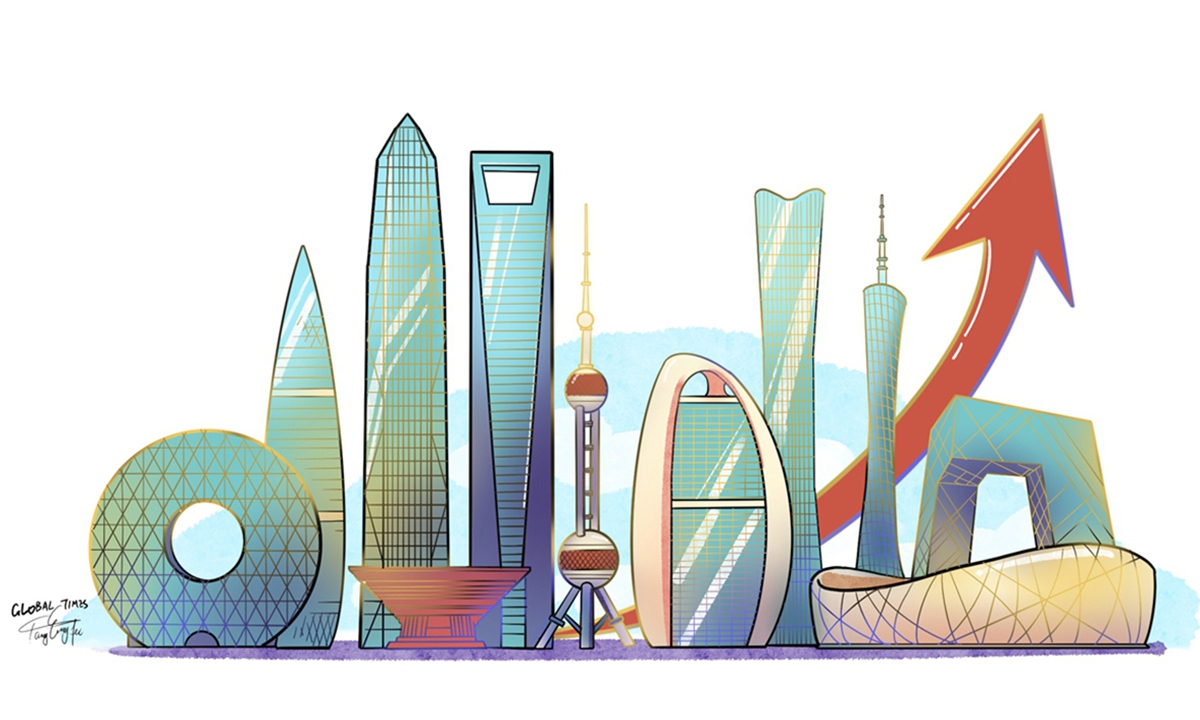
Illustration: Tang Tengfei/Global Times
When looking at China, the ongoing two sessions are a window. As the meetings unfold, wave of data pours out of the window. While looking at GDP, defense spending, R&D investment, and other key data, please pay attention to the CPI.
China's consumer price index (CPI), a main gauge of inflation, rose 2 percent year on year in 2022, which shined among major global economies. Moreover, in a government work report submitted Sunday to the national legislature for deliberation, China has set a 2023 target of around 3 percent for its CPI - only one percent increase.
Our recommendation is to compare the CPI with that of the US and some Western countries before judging or anticipating the direction of China's economic policy.
After hitting a 40-year peak inflation rate of 9.1 percent in June 2022, the US has seen seven consecutive months of decline. However, the CPI still rose more than market expectations in January. It is also estimated that inflation across the eurozone reached 8.5 percent in January.
By March of this year, the Federal Reserve has handily suppressed inflation for a whole year, but the effect still does not seem to be obvious. Inflation in the US is probably becoming a chronic disease severely constraining the US economy and causing the most pains to the global economy.
Why is inflation so severe in the US and so low in China?
Behind the different economic cycles, structures and elements included in the CPI are the different economic policies to deal with the spread of COVID-19. Today's inflation in the US comes from indiscriminate issuance of money (subsidies), trillions of greenbacks spread out. Can it not be inflationary?
Conversely, China has adopted a completely different policy and maintained a prudent monetary policy. In contrast to the "open floodgates" in Europe and the US, the Chinese government has been cautious about a comprehensive stimulus package, avoiding an overly loose monetary policy and not injecting too much liquidity into the market.
China does this because it has the world's most extensive manufacturing system, a large industrial capacity and trade surplus, and is largely self-sufficient in food and coal, with ample oil reserves and diversified energy imports. Thus, the Chinese government can respond more comfortably to global commodity price increases and other imported inflation.
China is a responsible country, and it will not adopt a selfish economic policy in these difficult times, shifting the burden it should have borne to the world.
What is more? During Donald Trump's term, Washington wielded the trade sanctions stick against China. The Joe Biden administration has followed suit and sought to "decouple" from China in the supply chain of critical products, preventing the smooth functioning of the global supply system, inadvertently increasing the cost of supply, and pushing up commodity prices.
China is a developing socialist country with a large population. The government is more focused on building the foundation for stable social welfare development, so its policies during the epidemic focused on raising subsidies mainly for low-income people, raising pensions and health insurance levels, and reducing tax burdens for small and medium-sized enterprises to ensure the basic needs of the people while maintaining the broad fundamental base of China's manufacturing industry. This is reflected in Sunday's government work report and foreshadows the direction of China's future economic policy focus.
China's economy is in an upward period of steady recovery after the epidemic, and inflation is expected to rise gradually. However, work report shows that China will continue to take the initiative to control inflation and consolidate the policy of preventing inflationary input externally and deflationary pressure internally.
At a time when major global economies still have to cope with inflation in a nervous and hectic manner, a strongly recovering China with a low inflation will show the world the policy-control capabilities its government has and will give more confidence to those who are worried about the global economy.




